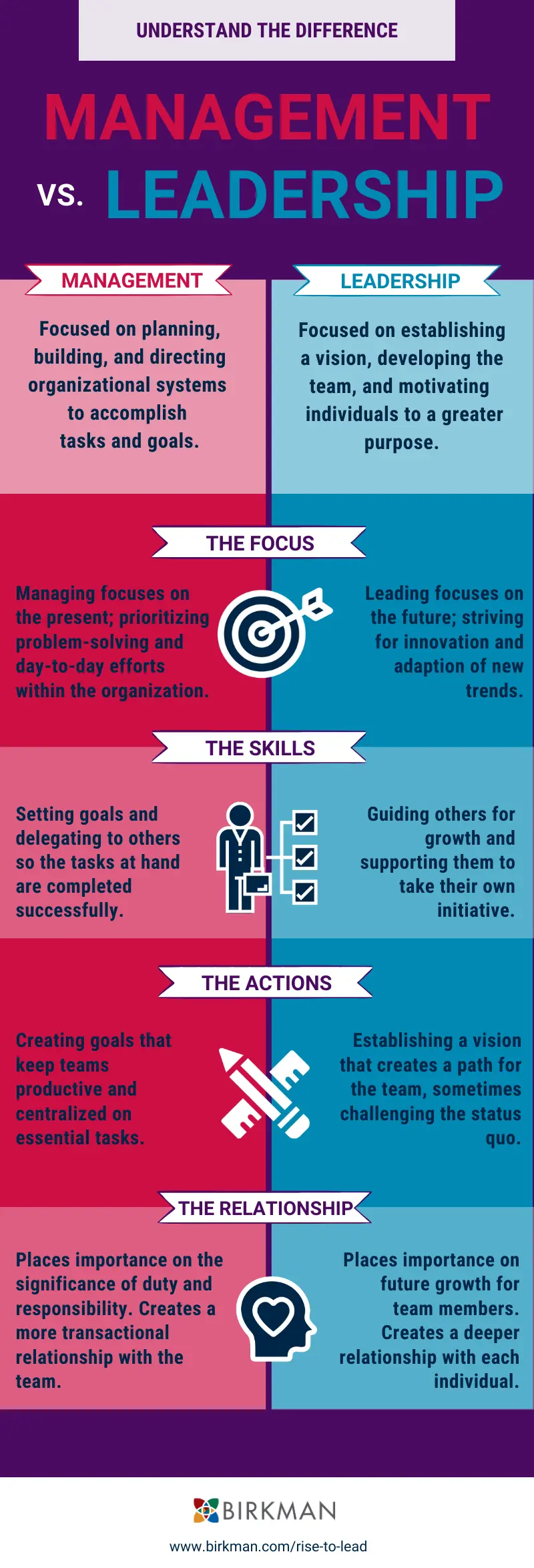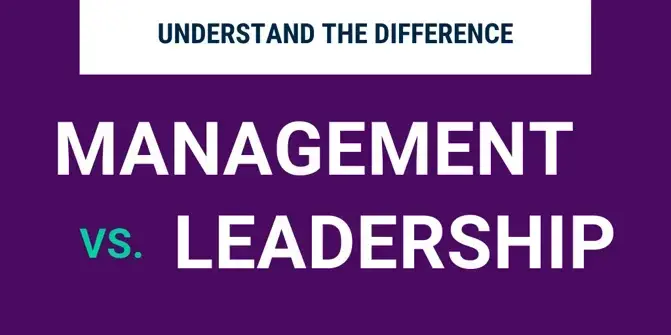In today's society, everyone wants to be a leader. Being a "leader" is like being the golden child of the business world, and being a "manager" feels like... being the middle child who everyone forgets about. The internet is full of articles that talk about why you should be a leader and not be a manager—that being a leader is much more desirable. While I, too, agree that inspiring others and creating a vision is critical to business success and employee engagement, I also believe that these claims are leaving out a crucial element: context. Instead of focusing on either being a leader or being a manager, we thought more about which situations require leadership and which situations require management. By focusing on leadership and management as verbs instead of nouns, you can shift your attention to what actions are required of you by the specific individual, team, or situation that you are dealing with. You are guaranteed to be more effective by thinking about the actions you need to take based on the context—not just trying to "be a leader."
The Difference Between Leadership and Management
At Birkman, we believe that "Management is preparing your team to handle the issues we have in front of us today. Leadership is preparing them to tackle the issues we don't know about yet." This quote not only provides excellent differentiation between management and leadership but also reveals why organizations need both. If you only prepare your team for the future, they will forget to work on the present. If you have your team working on the present, they will not be ready for the future. A healthy organization knows that it needs to strengthen both it's leadership and management muscles to be as strong as possible.
President Dwight D. Eisenhower said, “Leadership is the art of getting someone else to do something you want done because he wants to do it.”
Leadership is focusing on a potential change by establishing direction, aligning people, and motivating and inspiring individuals. Leadership initiatives include:
- Setting a vision
- Innovating new ideas or approaches
- Developing others
- Motivating a team
Management is focused on planning, building, and directing organizational systems to accomplish missions and goals. Management initiatives include:
- Setting goals
- Minimizing risk for the business
- Delegating to others
- Prioritizing tasks
Unfortunately for organizations, not everyone who is labeled as a leader has strong management skills, and not everyone who is labeled as a manager has strong leadership skills. It's vital that you can do both of these things to best accomplish the organization's goals.
Review the infographic below on the difference between management and leadership:

Differing Qualities
Managing and leading differs in many different aspects, such as their focus and skills. So let's break down some of the qualities that each possesses:
Focus: As mentioned before, managers have a tendency to focus on the present tasks at hand. They delegate day-to-day efforts, establish procedures, and oversee problem-solving. They pay little attention to situations beyond the present yet excel at keeping their team on track. Leaders have a futuristic mindset. They are focused on the development of their team and organization. Every action is with the intention of how it could be beneficial in the future, and that is what is most valuable to them. They strive for innovation and adaption to imminent trends.
Create: Managers enjoy setting goals. These goals keep their teams productive and centralized on essential tasks. When accomplished, these goals can be very advantageous. However, their perceptions of what is essential may be short-sighted. On the other hand, leaders tend to establish a vision. They envision a path for their team that will bring them success and isn't afraid to challenge the status quo. Developing an unprecedented vision can be instrumental to the company's success, as long as they don't forget that setting SMART goals may be the best way to implement that vision.
Skills: Managers have a talent for directing others, planning useful strategies, and building upon their decision-making process to bring results. They maintain the discipline to take necessary action, making sure practical work is completed smoothly and effectively. In comparison, leaders possess skills to align others with their mission and motivate them to take the initiative. They communicate with their team so that they are along for the journey to success.
Feels: A manager's sense of self-worth is enhanced through strengthening existing institutions, performing in a role that harmonizes the significance of duty and responsibility. Their command-and-control mindset and low emotional involvement level promote a transactional feeling between the managers and their teams. Comparatively, leaders hold a sense of profound change, whether in their relationships or their work ethic. They are motivated by continuous development. They share this theme in their teams' culture, using emotion and passion to driving their projects.
You may wonder when it is best to perform as a manager or a leader. Certain situations may require a more direct course of action and candid communication, while others may call for forward-thinking ideas and incentivizing conversation.
What to Ask Yourself
Here are a few questions you can ask yourself to know if you should approach a situation using leadership behaviors or management behaviors:
- Who are you working in this situation?
- Is this a people problem or a task problem?
- Is this a present problem or a future problem?
- Are you expected to exhibit leadership skills at your level or role within the organization?
A Good Manager is Also a Good Leader
Upon breaking down the differences between leading people versus managing work, the challenge is not figuring out the correct style. In fact, both strategies are beneficial, but it all depends on the context of the situation to determine what actions should be taken and how they should be carried out. Management consists of directing a group or a set of entities to accomplish a goal. Leadership refers to an individual's ability to influence, motivate, and enable others to contribute toward organizational success. Pulling aspects from both managers and leaders will keep operations running smoothly while also inspiring visions for future prosperity. Therefore, it is essential to demonstrate the situational qualities of a manager and a leader.
It may feel counter-intuitive for those with a managerial mindset to exemplify leadership qualities and vice versa. With the proper guidance and training, new managers can utilize both sides with ease. Birkman capitalizes on improving workplace relationships and situational EQ. With our data, managers leverage their strengths to strategize ways to maintain peak performance for day-to-day tasks and subsequent initiatives.

